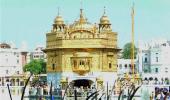'The Badals have made the Akali Dal a family enterprise and undermined the Sikh faith. They have no right to call themselves Akalis. We have approached the Election Commission to register ourselves as the Akali Dal with a different nomenclature. We will impress on people’s minds that we are the real Akali Dal,'
Sai Manish reports on the fight for supremacy over the Akali Dal.

As the Shiromani Akali Dal, India’s oldest regional party, gears up to mark its 100th year, it faces an existential crisis.
Yet again.
The Dhindsa clan, whose patriarch Sukhdev Dhindsa, a minister in the erstwhile Atal Bihari Vajpayee Cabinet, has raised the banner of revolt.
Dhindsa, along with a group of renegades, after being expelled by the party earlier this year, has claimed ownership of the Akali Dal by passing a resolution to dislodge Sukhbir Singh Badal as the party’s president.
This is the second revolt among the Akalis in as many years.
In the run-up to the 2019 elections, some of the party’s top leaders had drifted away to float the Akali Dal-Taksali, an outfit which is now gravitating towards Dhindsa and attracting anti-Badal leaders to make one final push to end the Badal clan’s association with the party.
“The Badals have made the Akali Dal a family enterprise and undermined the Sikh faith. They have no right to call themselves Akalis. We have approached the Election Commission to register ourselves as the Akali Dal with a different nomenclature. We will impress on people’s minds that we are the real Akali Dal,” said Parminder Dhindsa, son of Sukhdev and an MLA in Punjab.
Thanks to the Narendra Modi factor, in the 2019 general elections, the Akali Dal won two seats, the same as the Bharatiya Janata Party.
Now the key to the Badals’ survival lies with Union home minister Amit Shah.
The home ministry has to set the ball rolling for elections to the Shiromani Gurudwara Prabhandak Committee, the “Sikh parliament” entrusted with managing all affairs connected with the religion.
The last SGPC elections were held in 2011, and since 2016, when its five-year term ended, the body has been virtually running on extensions granted by the central government.
In Punjab politics, whoever runs the SGPC is considered the real Akali Dal and those who run the Akali Dal are expected to dominate the SGPC.
Those who were turfed out by the Badals are now looking forward to the SGPC elections.
Dhindsa is believed to be inching closer to the BJP and reportedly campaigned for the party in the 2019 elections.
He, along with other rebels, has urged Shah to call elections to the 170-member SGPC without delay.
But Shah isn’t too keen to do so right away.
With the assembly elections due in 2022 and the Akali Dal performing no better electorally than its junior partner in the state, Shah, by virtue of his unfettered powers to call the SGPC elections, could well decide the timing.
“A democratic party formed to uphold the tenets of Sikhism has degenerated into a family-run enterprise. I think, as long as Parkash Singh Badal, 94, is around, the Akalis would win the SGPC elections. After him, the party could witness a massive churn,” said Ashutosh Kumar, political analyst.
Bir Devinder Singh, former deputy speaker of Punjab and a member of the Akali Dal-Taksali, has a different view on the matter.
“The Badals and their supporters will be routed from the SGPC. They have betrayed the Sikhs. Sukhbir Badal’s support to the Dera Sacha Sauda’s Ram Rahim is well known. They even pressured the Akal Takht to go easy on Ram Rahim. Under their watch the Guru Granth Sahib was desecrated.”
However, the Akalis have tried to undo the damage caused by their perceived dilly-dallying with forces inimical to the interests of Sikhism.
In 2016, Parliament passed legislation that prohibited Sehajdhari Sikhs from voting in SGPC elections.
In a rousing speech in Parliament, Harsimrat Badal, minister and Sukhbir’s wife, championed it as an Akali initiative to restore the purity of the faith “by thwarting the designs of those conspiring to weaken the Sikh community”.
In effect, any Sikh who trims or shaves his beard or hair wouldn’t be allowed to vote in SGPC elections.
Those who called themselves Sehajdharis were exempt from this prohibition in the British era Act.
In addition, Dera Sacha Sauda chief Ram Rahim was convicted of rape by a Central Bureau of Investigation court in 2017 and is serving a 20-year prison term.
The Badals, who were targeted for their proximity to the controversial cultist, will go to town, claiming credit for his incarceration.
With most of the splinter Akali groups led by people riding into their political sunset, Sukhbir and Harsimrat remain the most prominent faces in the party.
But 2020 is different from 1997, when L K Advani and Parkash Badal formed the first BJP-Akali alliance, which fought every election together in the following years.












 © 2025
© 2025